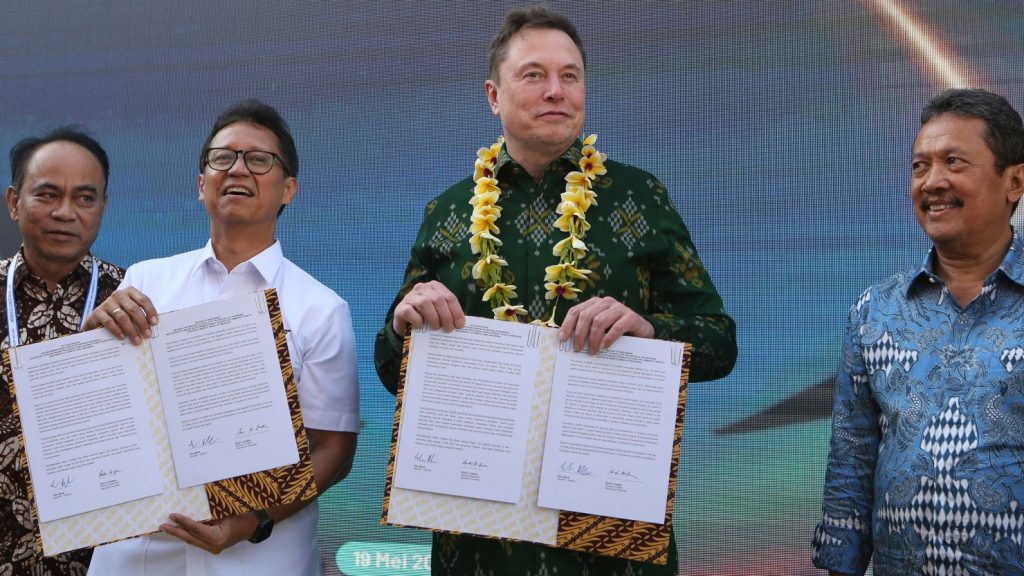Indonesia, the largest archipelago in the world, has recently welcomed the launch of Elon Musk’s Starlink satellite internet service, marking a significant milestone in the nation’s connectivity and technological advancement. This initiative is set to revolutionize internet access across Indonesia, a country comprised of over 17,000 islands, many of which have struggled with reliable internet connectivity due to their remote locations.
Starlink, a project by SpaceX, aims to provide high-speed internet to underserved and remote areas globally through a constellation of low Earth orbit satellites. This technology promises to deliver broadband speeds and latency comparable to traditional ground-based internet services, making it a game-changer for regions with limited or no internet access.
For Indonesia, the implementation of Starlink means bridging the digital divide that has long hindered economic and educational opportunities in its more isolated regions. Many rural and island communities in Indonesia have faced challenges such as slow internet speeds, high costs, and limited availability, which have restricted their ability to participate fully in the digital economy and access modern education and healthcare services.
The introduction of Starlink is expected to have profound impacts on these communities. For students, it means access to a broader range of educational resources and the ability to engage in online learning platforms, which have become increasingly important, especially in the wake of the COVID-19 pandemic. For businesses, reliable internet access can facilitate e-commerce, improve communication, and enable participation in global markets, fostering economic growth and development.
Healthcare services in remote areas will also see significant benefits. Telemedicine, which relies heavily on robust internet connections, can become more feasible, allowing residents in isolated regions to consult with specialists and receive timely medical advice without the need to travel long distances.
Furthermore, the improved connectivity provided by Starlink aligns with the Indonesian government’s initiatives to enhance digital infrastructure and integrate technology into various sectors of the economy. It supports the country’s vision of becoming a significant player in the global digital economy and ensures that even the most remote areas are not left behind in this digital transformation.
Elon Musk’s launch of Starlink in Indonesia is not just a technological advancement but a catalyst for social and economic development. It represents a significant step towards greater inclusivity and equity in internet access, ensuring that all Indonesians, regardless of their geographic location, have the opportunity to benefit from the digital age.
The launch of Elon Musk’s Starlink satellite internet service in Indonesia marks a transformative moment for the world’s largest archipelago, promising to bridge the digital divide that has long hindered many of its remote and rural communities. With over 17,000 islands, Indonesia’s diverse geography has presented significant challenges for establishing reliable ground-based internet infrastructure. Starlink’s technology, leveraging a constellation of low Earth orbit satellites, offers a viable solution to these challenges by providing high-speed, low-latency internet access to even the most isolated areas.
Starlink’s arrival is poised to have a multifaceted impact on Indonesian society. One of the most significant benefits is in the realm of education. For years, students in rural and remote areas have faced barriers to accessing quality educational resources due to inadequate internet connectivity. With Starlink, students can participate in online learning, access global educational content, and collaborate with peers and educators worldwide. This development is particularly crucial in the wake of the COVID-19 pandemic, which has underscored the importance of digital learning platforms.
In addition to education, the economic implications of Starlink’s service are profound. Small businesses and entrepreneurs in remote regions will gain access to reliable internet, enabling them to engage in e-commerce, expand their market reach, and improve their operational efficiencies. This connectivity can spur local economies, create jobs, and facilitate the integration of these regions into the broader national and global economy. For many, it means moving from subsistence to thriving commercial activities, fostering innovation and economic resilience.
